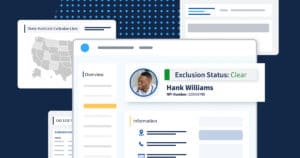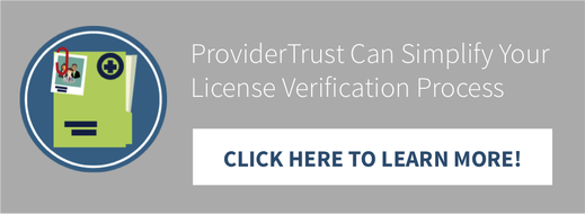We all know how extremely important it is to ensure that all employee licenses are up to date and properly verified but, although we may think we are doing enough, we could be terribly wrong.
An error in healthcare license verifcation and tracking is a very real possibility, especially within large companies that have thousands of employees and vendors. In a case like this, the responsibility of verifying licenses and other required documents falls on the company. But how can a company protect itself from a maliciously fraudulent employee?
In her article, Valerie Smith highlighted two particular incidences in which nurses in Maricopa County, Arizona, were found to be imposters. In October 2003, Carla Moore pled guilty and was convicted in Maricopa Superior Court of “Unlawful Practicing of Nursing”. She was sentenced to three months in jail, three years probation, restitution of $11,000 to the two facilities that hired her, community service, and permanently prohibited from working in the healthcare industry in any capacity.
Shannon Gail was convicted of a similar charge in February of 2004 when she submitted a copy of a nursing license that she had altered by placing her name on the document and changing the expiration date. She was charged with “Unlawful Representation of Nursing” and sentenced to 12 months probation, restitution, and permanently banned from the industry.
Since 2004, Arizona has seen a significant rise in fraudulent employees within the healthcare industry, which means it could be happening in your state as well. Employing such an individual puts your patients and your business at a serious risk. (Read more real-life case studies about companies hiring excluded nurses and the need for nursing license verification)
“Nurse imposters” can gain employment in many ways so be wary of all applicants.
Here is how Smith says they do it:
- An unlicensed person who poses as a “nurse” and who may subsequently practice nursing or represent to patients and the public that they are a licensed nurse.
- A person who gains nursing licensure based on fraudulent credentials.
- A person who steals the identity of another licensed nurse and practices.
- A person who is licensed in one capacity and alters his/her credentials and practices or attempts to practice in another capacity.
- A person claiming to be a licensed nurse who may have completed a nursing program and may have been licensed at one time, but is not currently eligible for nursing licensure.
Here is what to look for:
- Failure to provide the license.
- Provides copied & altered license.
- Look for non-uniform text, cut and paste lines, or a non-standard expiration date (standard is 6/30/__).
- Demonstration of competencies inconsistent with licensure.
- Inconsistent state of licensure information.
Here is what Smith recommends you do to protect your company:
- Insist upon seeing the original license, not a copy.
- If your organization or facility requires that a copy of the nursing license be maintained in the personnel file, make a copy from the original license.
- Do not allow an individual to work in a capacity that requires nursing licensure without having visualized the license and verifying the status of the license with the issuing Board of Nursing.
- If an individual presents a multistate license, their primary state of residence must be the state in which they have obtained the multistate license.
- Maintain the security of files that contain copies of nursing staff’s licenses.
- Report all cases of suspected fraudulent representation or practice of nursing to ASBN.
In an industry of such significance, it is our duty to practice due diligence when considering any new hire as well as maintaining a strenuous on-going monitoring practice.
Here are a few questions to leave you with…
- Do you consider your license-tracking plan to be effective?
- How often are you verifying required documents?
- How are expiration dates currently being tracked?
- Is consistency an issue within organizations that have multiple units and/or locations?
- Are there ways to improve your current strategy that will greatly reduce your risk, and possibly even save time?
You might also enjoy:
Healthcare license fraud is a reality – here’s how to avoid it
Primary source license verificaton: where, what, when
Three common nuances in the healthcare license verification process
How to combat license fraud with healthcare license verification
Time delays in healthcare license reporting to state licensing boards
Written by Michael Rosen, ESQ
ProviderTrust Co-Founder, mrosen@providertrust.com
Michael brings over 20 years of experience founding and leading risk mitigation businesses, receiving numerous accolades such as: Inc Magazine’s Inc 500 Award and Nashville Chamber of Commerce Small Business of the Year
Connect with Michael on Linkedin












